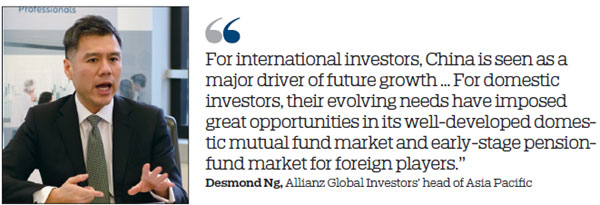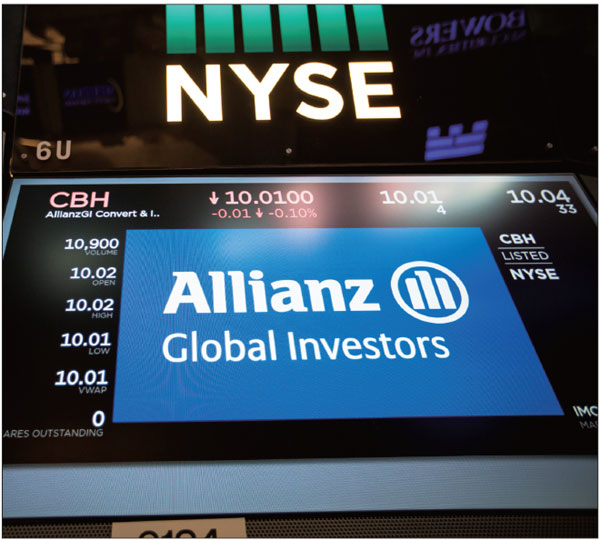Division of Munich-based financial services company sees bright future in China
Updated: 2019-05-10 07:22
By Sun Feier in Hong Kong(HK Edition)
|
|||||||
The investment management arm of financial services company Allianz SE is continuing to make progress in its effort to establish itself in China's onshore fund industry.
Allianz Global Investors obtained a private fund management license and registered with the Asset Management Association of China on March 25. The asset manager is this year's second wholly foreign-owned enterprise (WFOE) in the investment management field that has obtained this license, through which its fund is allowed to invest in onshore assets and sell to domestic qualified investors. The firm needs to launch at least one private fund product within six months of getting the license.
Desmond Ng, AllianzGI's head of Asia Pacific, said: "This marks another milestone for Allianz Global Investors, demonstrating our continued commitment to China, a key strategic focus market in the region."
The establishment of a WFOE office on the Chinese mainland two years ago was the first step in this strategy for AllianzGI, which views the world's second-largest economy as a long-term strategy. "It's a marathon; it's not a sprint," Ng said.

For international investors, China is seen as a major driver of future growth, given that both the equity and fixed-income markets were partially included into global indexes, Ng said. For domestic investors, their evolving needs have imposed great opportunities in its well-developed domestic mutual fund market and early-stage pension-fund market for foreign players.
AllianzGI now operates a growing team and is gradually adding investment capability in its Shanghai WFOE office, which gives the firm a good start, not just working with clients from a local office, but also looking deeper into the ability to develop investment solutions that are locally managed for local markets, Ng added.
In addition, AllianzGI also has a bit of regulatory leeway to run traditional or hedge-fund investing through a Qualified Domestic Limited Partnership structure, which allows the firm to provide services to mainland institutional investors and high-net-worth individuals. The asset manager doubled its quota to 2 billion yuan ($295.7 million) through the Renminbi Qualified Foreign Institutional Investor program.
Over the past few decades, the opening-up of the financial sector in China has seen a transition from strict restriction to certain opportunities. The future of the Chinese financial sector is going to further relieve the shareholding ratio of foreign capital, as well as further relax the qualifications for investing in China, given new stimuli that include removing the share cap of foreign investors, and the easing of policy related to qualified foreign institutional investors.
"I think the challenge with China is one that I don't think is unique to us," Ng said. "So, for example, the market is still at a very relatively early stage for foreign investors, so a lot of segments are still today not accessible to foreign investment firms and foreign asset managers, so we have to plant our seeds and we have to be on the lookout in terms of continued involvement and development of the market so that we can offer solutions to local investors."
Another challenge for Ng and his team is balancing local market development and offshore investments. Given investors' scarce allocation to local asset classes as well as little exposure in international strategies, a lot of effort in terms of education and engagement with clients is essential, Ng added.
Unlike some asset management companies offering passive strategies, beta strategies or "passive exchange traded fund" businesses, all the intellectual financial capital of AllianzGI is invested in active management.
Moving forward, the firm plans to further establish its social presence to tap into China's 12.6-trillion-yuan of assets under management in the fund industry, as well as to look at both inbound and outbound opportunities as Chinese asset classes, such as equity or fixed income, are becoming increasingly relevant for global investors, Ng said.
As moves in China accelerate in the area of regulation, market development, investor appetite and opening-up, the evolving trend toward the diversification of portfolio, risk management and technology transfer will be another focus for the company.
"We do believe that especially in markets in China, disruption is a key theme and it could potentially open up a new way for us to engage with clients, whether it is through how we communicate, how we provide content, or leveraging technology as a theme," he said.
The further collaboration with Chinese local financial institutions and its parent company - Munich, Germany-based Allianz SE - in the future could bring the firm's development to new heights, Ng said.
Last year, Allianz received approval to prepare for the establishment of China's first fully owned foreign insurance holding company.
For China Daily
|
Allianz Global Investors obtained a private fund management license and registered with the Asset Management Association of China on March 25. Michael Nagle / Bloomberg |
(HK Edition 05/10/2019 page7)
